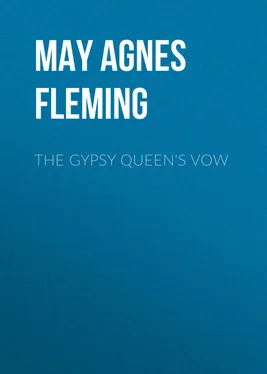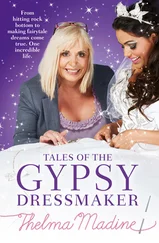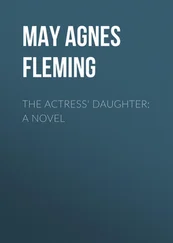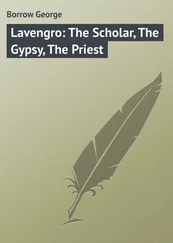May Fleming - The Gypsy Queen's Vow
Здесь есть возможность читать онлайн «May Fleming - The Gypsy Queen's Vow» — ознакомительный отрывок электронной книги совершенно бесплатно, а после прочтения отрывка купить полную версию. В некоторых случаях можно слушать аудио, скачать через торрент в формате fb2 и присутствует краткое содержание. Издательство: Иностранный паблик, Жанр: foreign_antique, foreign_prose, foreign_sf, на английском языке. Описание произведения, (предисловие) а так же отзывы посетителей доступны на портале библиотеки ЛибКат.
- Название:The Gypsy Queen's Vow
- Автор:
- Издательство:Иностранный паблик
- Жанр:
- Год:неизвестен
- ISBN:нет данных
- Рейтинг книги:4 / 5. Голосов: 1
-
Избранное:Добавить в избранное
- Отзывы:
-
Ваша оценка:
- 80
- 1
- 2
- 3
- 4
- 5
The Gypsy Queen's Vow: краткое содержание, описание и аннотация
Предлагаем к чтению аннотацию, описание, краткое содержание или предисловие (зависит от того, что написал сам автор книги «The Gypsy Queen's Vow»). Если вы не нашли необходимую информацию о книге — напишите в комментариях, мы постараемся отыскать её.
The Gypsy Queen's Vow — читать онлайн ознакомительный отрывок
Ниже представлен текст книги, разбитый по страницам. Система сохранения места последней прочитанной страницы, позволяет с удобством читать онлайн бесплатно книгу «The Gypsy Queen's Vow», без необходимости каждый раз заново искать на чём Вы остановились. Поставьте закладку, и сможете в любой момент перейти на страницу, на которой закончили чтение.
Интервал:
Закладка:
It was a pleasant scene on which the light of the rose-shaded chandelier fell. The superbly-furnished dressing-room of Lady Maude Percy was all ablaze with numberless little jets of flame, which the immense mirrors magnified four-fold. Priceless jewels lay carelessly strewn about on the inlaid dressing-table, mingling with rare bouquets, laces, gloves, and tiny satin slippers, that would scarcely have fitted Cinderella herself. Lady Kate McGregor, proud and stately, in white satin, and point-lace, and pale, delicate pearls, stood leaning against the marble mantel, her handsome eyes growing cold and scornful whenever they rested on Miss Clara Jernyngham. That frivolous little lady, quite bewildering in the same snowy robes, was all unconscious of those icy glances, as she fluttered, like a butterfly over a rose, around another lady standing before a full-length mirror, while her maid arranged the mist-like bridal veil on her head, and set the orange wreath on her dark, shining curls.
It was Lady Maude Percy; and this was her bridal eve. Peerlessly lovely she looked as she stood there, with the light of a happy heart flushing her rounded cheeks, swelling her white bosom, and flashing from her dark, Syrian eyes. The bridal dress she wore was worth a duke’s ransom. It fell around her like a summer cloud, three glistening folds of richest lace, so light, so gauzy, so brilliant, that it looked like a flashing mist. Diamonds that blinded the eyes with their insufferable light rose and fell on her white bosom with every tumultuous throb of the heart beneath. Like a floating cloud fell over all the bridal veil, and glittering above it rose the orange wreath of rarest jewels. There was a streaming light in her magnificent eyes, a living, glowing flush on her cheek, all unusual there; and little Miss Clara stood up and clasped her hands as she gazed in speechless admiration.
It was one month after the interview recorded in the last chapter. Lord Villiers, with a lover’s impatience, would consent to wait no longer; and as Lady Maude had not opposed him, this day had been fixed. The marriage was to have taken place at St. George’s, in the morning; but early that eventful day the bride had been seized with so severe a headache that she was unable to leave her room. Therefore, the ceremony had been necessarily delayed until the evening, when the august bishop of C – himself was to come and perform the nuptial rite at the Percy mansion. Some were inclined to look upon this interruption in the light of an evil omen; but Lady Maude only smiled, and inwardly thought that, as his bride, nothing on earth could ever darken her life more. How little did she dream of the bitter cup of sorrow she was destined yet to drain to the dregs! How little did she dream of the dark, scathing, unresting revenge that hovered around her like a vulture waiting for its prey!
The old earl, her father, who was somewhat old-fashioned in his notions, and liked ancient customs kept up, had determined his daughter’s bridal should be celebrated by the grandest ball of the season.
“I don’t like this new-fangled way young people nowadays have, of getting married in the morning, coming home for a hasty breakfast, and then tearing off, post-haste, for France, or Germany, or somewhere, as if they wanted change of scene to reconcile them to what they have done,” said the old gentleman, in strict confidence, to Lord De Courcy. “It wasn’t so in my time. Then we had all our friends assembled, and enjoyed ourselves together over a bottle or two of old wine until morning. Ah! those were the days.” And the old earl heaved a deep sigh, and looked ruefully at his gouty foot.
Resolving, therefore, to keep up those halcyon days at all hazards, the great saloons of the stately hall were thrown open, and now they were filled with the elite of the city, all waiting impatiently for the coming of the bride.
Lord Hugh De Courcy, suave, stately, courteous, and bland, was there, conversing with the father of the bride, and two or three of the most distinguished politicians of the day – his eyes now and then wandering from the faces of his friends, to rest proudly on the handsome form of his son, who, in the absence of Lady Maude, was the cynosure of all eyes, the “observed of all observers.”
The venerable and high-salaried bishop, attended by several other “journeyman soul-savers,” as Captain George Jernyngham irreverently called them, was there, too, in full pontificals, all ready, and waiting to tie the Gordian knot.
The rooms were filled with the low hum of conversation. There were waving of fans, and flirting of bouquets, and dropping of handkerchiefs, and rustling silks and satins, and flashing of jewels, and turning of many bright, impatient eyes towards the door where the bride and her attendants were presently expected to make their appearance. Ladies coquetted, and flirted, and turned masculine heads with brilliant smiles and entrancing glances, and gentlemen bowed and complimented, and talked all sorts of nonsense, just like gentlemen in general, and all things went “merry as a marriage-bell.”
Standing by themselves, as when we first saw them, were Lord Ernest Villiers and his friend, Captain Jernyngham, of the Guards.
Handsome, stately, and noble, Lord Villiers always looked; but more so now than ever. What man does not look well when happy, faultless in costume, and about to be married to the woman he loves?
Captain Jernyngham, first groomsman, etc., was also looking remarkably well – a fact of which the young gentleman himself was well aware; and lounging in his usual listless attitude against a marble column, he languidly admired his aristocratically small foot in its shining boot.
“There are some men born to good luck, just as others are born to be hanged” – he was saying, with the air of a man delivering an oration – “born with a silver spoon in their mouths, to use a common, but rather incredible figure of speech. You, mi lor Villiers, are one of them; you were born above the power of Fortune – consequently, the toadying jade shows you a face all smiles, and gives the cold shoulder to poor devils like me, who really stand in need of her good graces. This world’s a humbug! Virtuous poverty, illustrated in the person of Captain George Jernyngham, is snubbed and sent to Coventry, while potent, rich, and depraved youths like you are borne along on beds of roses. Yes, I repeat it, the world’s a humbug! society’s a nuisance! friendship’s a word of two syllables found in dictionaries, nowhere else! and cigars, kid gloves and pale ale are the only things worth living for. There’s an ‘opinion as is an opinion.’”
“Oh, come now, Jernyngham! things are by no means so desperate as you would have me believe,” said Lord Villiers, laughing. “Young, good-looking, and adored by the ladies, what more would you have?”
“Well, there is a vulgar prejudice existing in favor of bread and butter, and neither of the three items mentioned will exactly supply me with that useful article. I intend trying the matrimonial dodge, some day, if I can pick up anything under fifty, with three or four thousand a year, who wants a nice youth to spend it for her.”
“Love, of course, being out of the question.”
“Love!” said the guardsman, contemptuously. “I lost all faith in that article since I was fourteen years old, when I fell in love with our cook, a young lady of six-and-thirty. My father forbade the banns; she ran off with a hump-backed chimney-sweep, and I awoke to the unpleasant consciousness that ‘Love’s young dream’ was all bosh.”
“And you have been heart whole ever since?”
“Well, I rather think so. I have felt a peculiar sensation under my vest-pocket now and then, when Kate McGregor’s black eyes met mine. But pshaw! where’s the use of talking? She’s as poor as a church-mouse, and so am I; and, unless we should set up a chandler-shop, there would be a paragraph in the Times headed: ‘Melancholy death by starvation. The bodies of an unfortune couple were found yesterday in the attic of a rickety, six-story house, and the coroner’s inquest returned a verdict of “Death for want of something to eat.” The unfortunate man was dressed in a pair of spurs and a military shako – having pawned the rest of his clothing, and held in his hand the jugular bone of a red herring half-devoured.’ Not any, thank you!”
Читать дальшеИнтервал:
Закладка:
Похожие книги на «The Gypsy Queen's Vow»
Представляем Вашему вниманию похожие книги на «The Gypsy Queen's Vow» списком для выбора. Мы отобрали схожую по названию и смыслу литературу в надежде предоставить читателям больше вариантов отыскать новые, интересные, ещё непрочитанные произведения.
Обсуждение, отзывы о книге «The Gypsy Queen's Vow» и просто собственные мнения читателей. Оставьте ваши комментарии, напишите, что Вы думаете о произведении, его смысле или главных героях. Укажите что конкретно понравилось, а что нет, и почему Вы так считаете.












